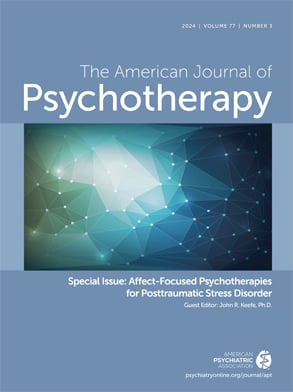I recently had the privilege of attending the annual conference of the Council of Science Editors. This organization brings together publishers, editors, and science writers who spend several days discussing the art and business of scientific publishing. During the conference, I was struck, however, by the seemingly artificial categorization of scientific journals as either “new/emerging” or “old/established.” Arguably, journals at different stages of their life cycle experience different challenges, and therefore these designations may be helpful in guiding journal development. For instance, new journals may be very flexible and responsive to trends in their field but struggle to find an audience; old journals may have well-established followings but struggle to pivot when needed.
The American Journal of Psychotherapy defies easy categorization because it is both an old and a new journal. It is a well-established journal with its 60-plus year history of publication under the auspices of the Association for the Advancement of Psychotherapy. But it ceased publication in 2016, resuming in 2018 at APA with a new editorial staff, a new publisher, and a transitioning editorial board. Being both established and emerging, the American Journal of Psychotherapy experiences the privileges and perils of youth and age.
The journal has deep roots. Its first editorial, published in 1947, set forth the following principles: “[W]e shall display no partisanship regarding the psychotherapeutic approach; on the contrary, we shall do all in our power to foster a better mutual understanding between the various schools of psychotherapy in so far as they are founded on firm clinical ground,” and “We are also aware of the great demand for psychotherapeutic services. . . . We shall, therefore . . . promote all organizational endeavors to make psychotherapy available to large numbers of individuals suffering from nervous and mental disorders” (
1). These principles continue to guide the
American Journal of Psychotherapy today.
When the journal was founded, however, psychotherapy was in its infancy. Very little psychotherapy research had been conducted, and therefore no emphasis was placed on psychotherapy outcomes or process research. Over half a century later, data have begun to accrue about how psychotherapy works and for whom. As the journal evolves, commensurate with a maturing field, we increasingly seek articles that are evidence based and contribute to the growing psychotherapy research literature. This represents a change. Although the American Journal of Psychotherapy continues to prioritize articles with clinical relevance, articles with pure clinical content now appear primarily as Psychotherapy Tools.
Previously, the American Journal of Psychotherapy was minimally indexed. Now, it is fully digitized and searchable, with a rich archive of back content dating to 1947, the journal’s inception. Another piece of good news for researchers and prospective authors is that the APA has taken steps to restore indexing in Web of Science, and thus citations to articles published in 2018 and 2019 will be considered in the 2020 calculation of impact factors, which will be reported in June 2021.
As the American Journal of Psychotherapy continues to evolve, we strive to retain the guiding vision of its founders while making it relevant in the 21st century. My vision for the journal as it moves into its second year of publication as an APA journal is to ensure that the articles we publish are scientifically accurate, inform clinical practice, and tell our readers something new about psychotherapy. As Editor of the new American Journal of Psychotherapy, I see my role as preserving its best features while working to ensure that its new content informs the science and practice of psychotherapy today.

